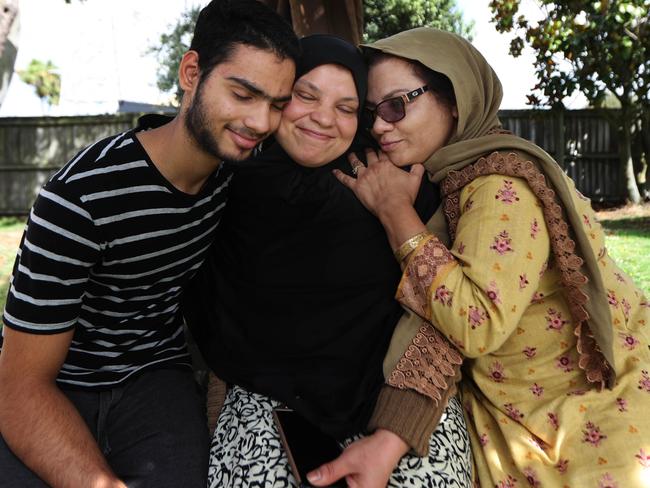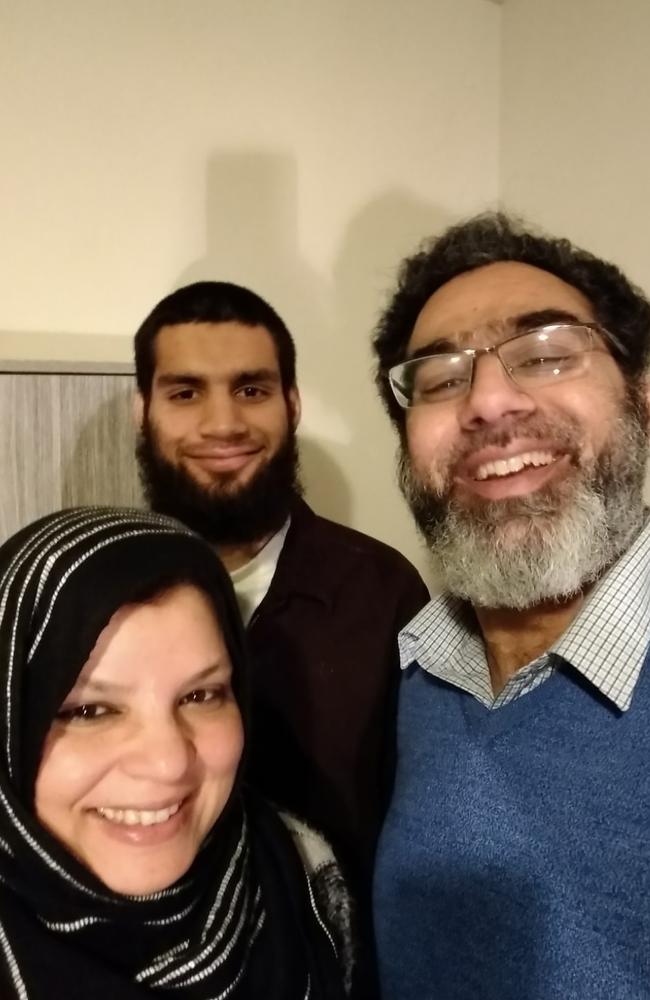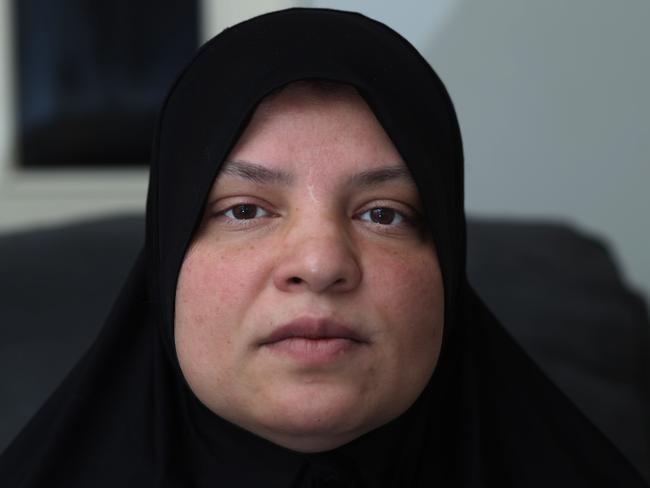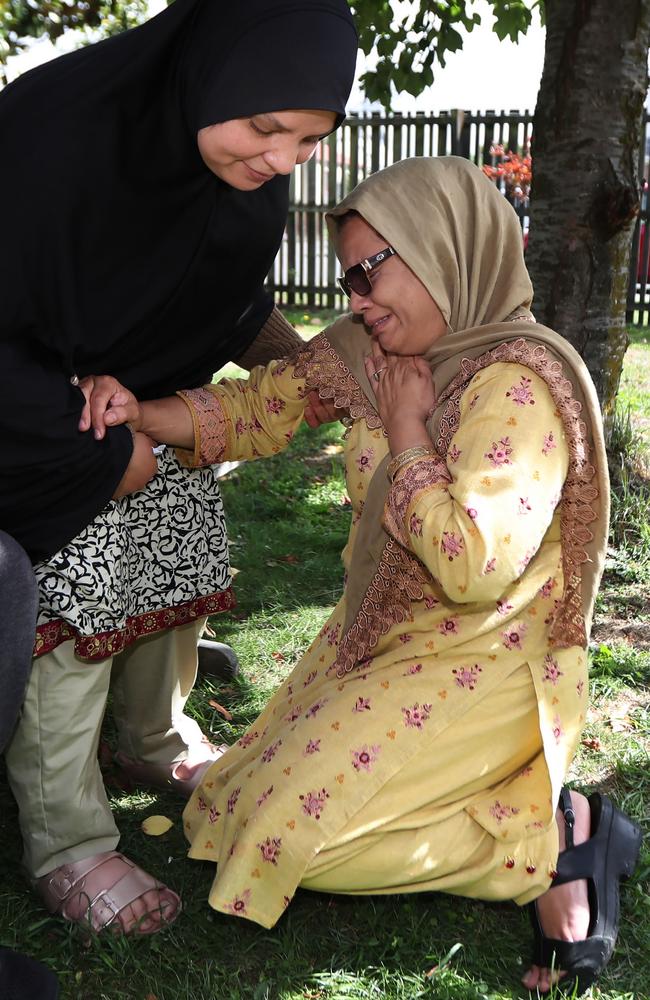Loved ones of Christchurch mosque shootings victims find solace in Muslim faith
Ambreen Naeem Rashid lost her husband and son in the Christchurch massacre, but she has tapped into her Muslim faith to find inner peace.
World
Don't miss out on the headlines from World. Followed categories will be added to My News.
It is hard to know whether she is a study in profound faith or unaddressed trauma.
In the absence of certainty, it must be assumed Ambreen Naeem Rashid, 44, who lost her husband and her son in the first mosque attack last Friday, is a person of the deepest devotion.
There are no tears as she recounts their lost lives, only serenity.
The Pakistani community Ambreen belongs to was hit worst in the massacre, losing nine people.
But she believes her husband and son — and indeed all who were murdered — are “shahid”, or martyrs, and says people must not feel sad for her.
“They were in the house of Allah,” she says.
“They had cleansed themselves before praying.”
Her husband, Naeem Rashid, 51, briefly rushed at Brenton Tarrant as he first entered the Al Noor mosque, spraying bullets.
He has been described as a hero in a slaughter where few got a chance to even react, so sudden and shocking was the raid.
Her son, Talha Rashid, 21, was with a group of mates.
MORE: Mundine joins Christchurch mourners
MORE: NZ terror attack exploited in ‘toxic’ games
MORE: PM’s fiery face off with Waleed

Ambreen says was shot in the back trying to protect his friends and fell on top of them, dead.
She says yes, she has cried. But she is reluctant to permit herself such an indulgence.
“I have learned we have to accept things,” she says.
“If Allah gives me a test, he will also give me strength and patience.”
The massacre has taught the world a lot more about what it means to be Muslim.
What’s often seen as fanaticism is a level of religious conviction many of us find hard to comprehend.
The family of five, including Ambreen’s surviving sons, Abdullah, 19, and Ayeen, six, came to New Zealand across 2010 and 2011.
Naeem had been a successful banker in Pakistan but had reached a time in life where he felt a responsibility as a Muslim to step away from business and use his knowledge to take lower pay as a teacher while completing a PhD.
They were not refugees but a working migrant family and Naeem, who had lived in Pakistan and for a time among the skyscrapers of Dubai, felt he wanted the family to be closer to nature.
“The first time we stepped off the plane we saw the blue sky of New Zealand,” says Ambreen.

OPINION: Muslims deserve our PM’s respect, says Mundine
OPINION: Turkey and Australia must stand together
Her sister was already in Christchurch; and they were not put off by the 2011 earthquake. They knew this place would be home forever.
Christchurch, New Zealand’s second-biggest city, is a remarkably liveable place.
The earthquake destroyed much, but in the place of the ruins ultra-modern, low-rise buildings have sprung up.
It feels like there’s money and opportunity here and, most of all, a sense that all are welcome to participate to be a part of it, wherever they are from.
Brenton Tarrant has not undone that. Nor has he shaken Ambreen’s faith.
“I was at home,” she says of the moment he struck.
“It was around 1.40pm. I had a feeling … the masjid (Al Noor mosque) is not far from our place. But this is such a peaceful place. All the people are so peaceful. And at 2pm my sister called and said, ‘Where are Naeem and Talha?’ She said there was a shooting.”
Naeem always called or texted if there was an issue. But there was nothing.
“And then somebody told me Naeem was in the hospital …”
She could get no information.
On Friday afternoon, someone showed her a copy of Tarrant’s live-streamed video.
“I didn’t want to but got the courage and watched with half-closed eyes,” she says.
“I recognised Naeem. I recognised his clothes. He tried to confront him (the shooter). I didn’t want to watch anymore.”

She describes Talha as a “very kind, very gentle person”.
He was a civil engineer who graduated quickly and was working.
“Someone told me he was praying with his friend (another engineer) and died as a shield for his friend”
Her faith tells her that her son’s time had come but the friend’s time “was not over yet”.
Just a month before, she heard her husband and son talk about dying as martyrs — not the commonly misunderstood Western interpretation of strapping on a suicide vest, but just doing good.
And, she says, they died that way.
“Allah likes us to save our own life or someone else’s. Yes, they were martyrs. My husband saved others, and so did my son.”
Ambreen is surrounded by family and new friends, some who have never met the family but have turned up to offer support.
“Yesterday an Australian came here and said, ‘I feel ashamed for my country.’ I said, ‘No. Don’t think that. Even if a Muslim had killed people, they are not Muslims.’”
She has this to say about the killer.
“I feel really sorry for him. I feel sorry for all the people who hate in their hearts. They can never have satisfaction.”

Ambreen is not surprised that her husband is being hailed as a hero for stepping in the path of the gunman shortly after he entered the Al Noor mosque during packed Friday prayers.
“My husband is brave,” she says.
“And I have lost my 21-year-old son. He was a gem. They are not with me, I can’t see them. But I feel happy. They are alive. I am happy with what my Lord gave me, because I want Him to be happy.”
As we take leave of Ambreen, her friends and family fall around her, wailing.
Yet still she smiles, the picture of someone capable of absorbing the worst life can bring.
It is though she feels she must be strong for them.
She is anxious that her youngest son Ayeen not be told, yet, what has happened.
But Abdullah, at 19, has some of his mother’s stoicism.
“When I think about it, it hurts,” he says.
“I’m happy they’ve gone to a better place but to me they’re still here. Death will come to everyone. The best way to prepare for it is to believe in my God.”
Sheik Sahib, who flew down from Auckland to assist with the funeral rites, which were delayed due to forensic and identification process, warns that many families of the dead were having trouble processing what happened.
“If people have lost someone and seem calm, it is unnatural. It is normal to let the tears flow. I have seen many who have gone into shock.”
Asked what he feels for the shooter, Nasir Khadar, 25, born to a Somali family in Holland and raised in Christchurch, says he cannot permit himself to spend too much time trying to rationalise Tarrant.
“Hate is a strong word I don’t like to use, but I do know the man was evil, that he was sick. Not to the point where he can get away with saying he was mentally ill. I don’t understand why he did that. It is pure evil, and it is a hate crime.
“Being on earth spreading love is the rent you pay for living on this earth.”
Originally published as Loved ones of Christchurch mosque shootings victims find solace in Muslim faith


